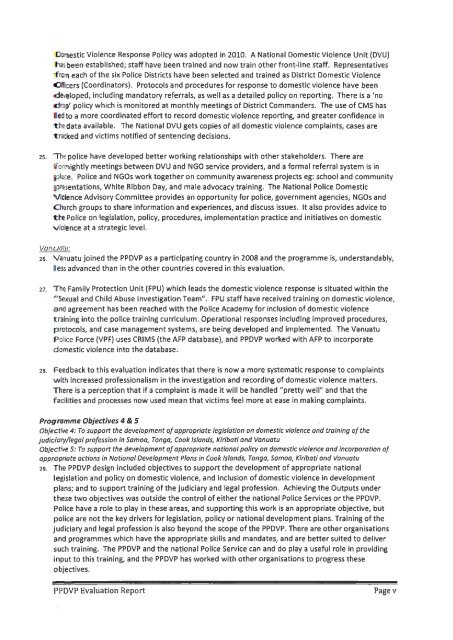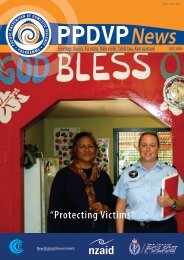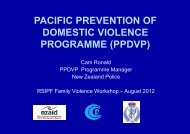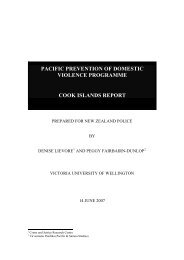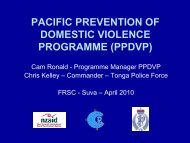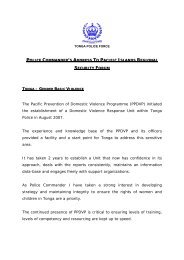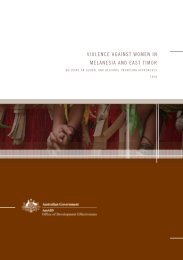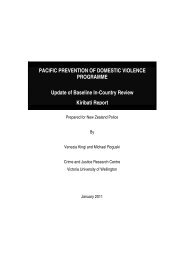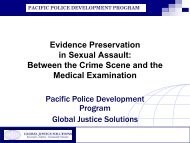PPDVP Evaluation Report - Pacific Prevention of Domestic Violence ...
PPDVP Evaluation Report - Pacific Prevention of Domestic Violence ...
PPDVP Evaluation Report - Pacific Prevention of Domestic Violence ...
You also want an ePaper? Increase the reach of your titles
YUMPU automatically turns print PDFs into web optimized ePapers that Google loves.
<strong>Domestic</strong> <strong>Violence</strong> Response Policy was adopted in 2010. A National <strong>Domestic</strong> <strong>Violence</strong> Unit (DVU)lhas been established; staff have been trained and now train other front-line staff. Representativesf ron each <strong>of</strong> the six Police Districts have been selected and trained as District <strong>Domestic</strong> <strong>Violence</strong>Clfficers (Coordinators). Protocols and procedures for response to domestic violence have beendeveloped, including mandatory referrals, as well as a detailed policy on reporting. There is a 'nodrop' policy which is monitored at monthly meetings <strong>of</strong> District Commanders. The use <strong>of</strong> CMS hasled to a more coordinated effort to record domestic violence reporting, and greater confidence inthe data available. The National DVU gets copies <strong>of</strong> all domestic violence complaints, cases aretracked and victims notified <strong>of</strong> sentencing decisions.2s. The police have developed better working relationships with other stakeholders. There are.r<strong>of</strong>inightly meetings between DVU and NGO service providers, and a formal referral system is inplxe. Police and NGOs work together on community awareness projects eg: school and community.pwentations, White Ribbon Day, and male advocacy training. The National Police <strong>Domestic</strong><strong>Violence</strong> Advisory Committee provides an opportunity for police, government agencies, NGOs andChurch groups to share information and experiences, and discuss issues. It also provides advice tothe Police on legislation, policy, procedures, implementation practice and initiatives on domesticviolence at a strategic level.Van uotu:26. Vanuatu joined the <strong>PPDVP</strong> as a participating country in 2008 and the programme is, understandably,less advanced than in the other countries covered in this evaluation.27. The Family Protection Unit (FPU) which leads the domestic violence response is situated within the"Sexual and Child Abuse Investigation Team". FPU staff have received training on domestic violence,and agreement has been reached with the Police Academy for inclusion <strong>of</strong> domestic violencetraining into the police training curriculum. Operational responses including improved procedures,protocols, and case management systems, are being developed and implemented. The VanuatuPolice Force (VPF) uses CRlMS (the AFP database), and <strong>PPDVP</strong> worked with AFP to incorporatedomestic violence into the database.28. Feedback to this evaluation indicates that there is now a more systematic response to complaintswith increased pr<strong>of</strong>essionalism in the investigation and recording <strong>of</strong> domestic violence matters.There is a perception that if a complaint is made it will be handled "pretty well" and that thefacilities and processes now used mean that victims feel more at ease in making complaints.Programme Objectives 4 & 5Objective 4: To support the development <strong>of</strong> appropriate legislation on domestic violence and training <strong>of</strong> thejudiclory/legal pr<strong>of</strong>ession in Samoa, Tonga, Cook Islands, Kiriboti and VanuatuObjective 5: To support the development <strong>of</strong> appropriate national policy on domestic violence and incorporation <strong>of</strong>appropriote actions in National Development Plans in Cook Islands, Tonga, Samoa, Kiribati and Vanuatu29. The PPOVP design included objectives to support the development <strong>of</strong> appropriate nationallegislation and policy on domestic violence, and inclusion <strong>of</strong> domestic violence in developmentplans; and to support training <strong>of</strong> the judiciary and legal pr<strong>of</strong>ession. Achieving the Outputs underthese two objectives was outside the control <strong>of</strong> either the national Police Services or the <strong>PPDVP</strong>.Police have a role to play in these areas, and supporting this work is an appropriate objective, butpolice are not the key drivers for legislation, policy or national development plans. Training <strong>of</strong> thejudiciary and legal pr<strong>of</strong>ession is also beyond the scope <strong>of</strong> the <strong>PPDVP</strong>. There are other organisationsand programmes which have the appropriate skills and mandates, and are better suited to deliversuch training. The <strong>PPDVP</strong> and the national Police Service can and do play a useful role in providinginput to this training, and the <strong>PPDVP</strong> has worked with other organisations to progress theseobjectives.<strong>PPDVP</strong> <strong>Evaluation</strong> <strong>Report</strong>Page v


